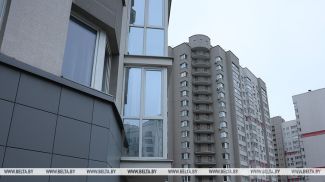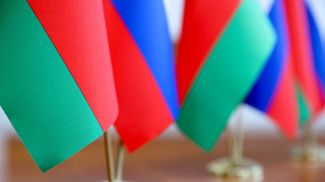MINSK, 22 April (BelTA) – A number of measures are being taken to protect the domestic market, BelTA learned from Deputy Antimonopoly Regulation and Trade Minister Oksana Konstantinovich on 22 April.
According to the source, a videoconference session of the interagency working group in charge of working out and adopting measures to protect the home market took place on 20 April. First Deputy Prime Minister Nikolai Snopkov, representatives of ministries, concerns, state committees, oblast administrations, and the Minsk City Executive Committee took part in the session. Oksana Konstantinovich continued: “Taking into account the lockdown, closed borders, prohibitions against exporting the most popular goods and rising prices across the globe, including food prices, it is of utmost importance for the economy to protect the home market. It is a complex task for all the government agencies, which work involves merchandise import, production, and trade. A government-approved set of measures to protect the home market in 2021-2022 is being implemented now.”
Participants of the session discussed in detail the measures being taken to reduce the import of foods, which are made in Belarus in sufficient quantities. “It was noted that the Belarusian economy is rather open within the framework of development of integration processes. Competition between Belarusian and foreign producers is getting tougher. The poor competitive ability of some Belarusian goods was mentioned (primarily their prices and in some cases quality). It is necessary to work on reducing prime costs and increasing the competitive ability of manufacturing. Apart from that, producers should put more efforts into positioning their products on the market. A comprehensive analysis of the market is in order for the sake of promoting the goods taking into account demand for them and consumer preferences,” the official noted.
Retailers should also put more efforts into promoting Belarusian goods. The share of Belarusian goods in the total retail volume has been falling for the last ten years. This is why maximum favorable treatment of Belarusian goods and producers inside the country is a key task today, Oksana Konstantinovich stressed.
The official mentioned three main vectors for protecting the home market. The mandatory choice of products in a retail outlet at all hours is one of them. Another one is inspections designed to ensure laws and regulations concerning trade and pricing are observed.
The introduction of trade regulations, including through legislation, is the third vector. The Antimonopoly Regulation and Trade Ministry has passed a number of regulatory acts meant to improve trade regulation. The ministry has also worked out recommendations on ensuring the observance of the national food security doctrine. In line with the doctrine the optimistic level of sufficiency of Belarusian foods on the home market stands at 80-85%. This level has been over 77% for the last few years. Priority placement of Belarusian goods in stores and their visual identification for buyers are some of the recommendations on observing the doctrine. “This year we've expanded recommendations onto online stores: Belarusian goods should be identified with a state emblem or part of the state ornamental pattern,” the deputy antimonopoly regulation and trade minister said.
In her words, the domestic market can be safely protected only on conditions of mutually beneficial cooperation of producers and retailers and on conditions of the mutual interest in promoting Belarusian goods. The main task of the Antimonopoly Regulation and Trade Ministry is to preserve the steady balance of supply and demand on the consumer market, Oksana Konstantinovich concluded.













